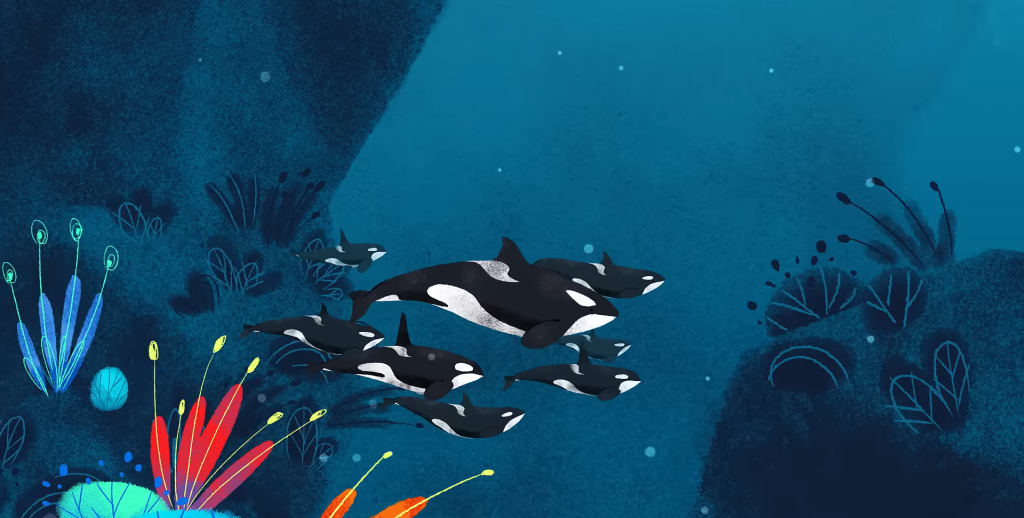Inside the killer whale matriarchy
The amazing grandmothers of the killer whale pod

In the chilly waters near the rocky Pacific Northwest coast, there are groups of killer whales. These whales are called killer whales because they are skilled hunters. Among these whales, the most knowledgeable hunters are the grandmothers. They are special because they can live for more than eighty years, while most male whales only live until their thirties. Until recently, we didn't know much about killer whales, even though they live in many oceans. But in 1976, a group called the Center for Whale Research started studying a specific group of killer whales near Washington State and British Columbia. Thanks to their work, we've learned a lot about these whales, known as the Southern Residents. The more we learn, the more we understand how important the older female whales are in this population.
Each grandmother whale starts her life as a baby whale in her mother's family group. They do everything together, like hunting, playing, and talking with their unique sounds. Both sons and daughters stay with their mothers' families for their whole lives. But it doesn't mean they only hang out with their relatives. They have their own special sounds, but they also understand the sounds of nearby families and socialize with them. When a female whale is around fifteen years old, they can mate with males from other groups during these meetings. But the relationships don't go beyond mating. The female and her babies stay with her family, while the male goes back to his own mother. Until she's about forty years old, the female has a baby whale every six years on average. After that, she goes through something called menopause, which is very rare in the animal world. Humans, killer whales, and a few other types of whales are the only ones where females keep living for a long time after they stop having babies.
After menopause, the grandmothers become the leaders in hunting for salmon, which is the main food for the Southern Resident killer whales. During most of the winter, they hunt far from the shore and also eat other kinds of fish. But when the salmon come closer to the shore to lay their eggs, the killer whales follow them. The grandmother shows the younger whales where to find the best fishing spots, and she shares up to 90% of the salmon she catches. As the years pass, her help becomes even more crucial because too many salmon are being caught, and their homes are being damaged, which puts the whales at risk of starving. The grandmothers' knowledge can mean the difference between life and death for their families. But why do they stop having babies? Normally, it's better for a female to keep having babies, even if she's also taking care of her existing kids and grandkids. However, there are some unique things about killer whales that change this.
In most animal species, some males or females leave their families when they grow up, but killer whales don't do that. So, as a female killer whale gets older, more of her family is made up of her children and grandkids, while more distant relatives die. Because older females are more closely related to the group, it makes more sense for them to help the whole family instead of having more babies. Younger females can focus on having babies. In the world of killer whales, every new baby means there's more competition for the same limited food. So, older females help their genes spread by supporting their adult sons, who have babies with other families. This might be why the females stop having babies in middle age.
Even with the grandmothers' help, the Southern Resident killer whales are in serious danger because there aren't enough salmon for them to eat. We need to act quickly to restore the salmon populations and save these whales from disappearing forever. In the long run, we should study other groups of killer whales too because what we've learned about the Southern Residents might not apply to all of them. By studying them closely, we might discover more surprising things and understand how humans can avoid harming their survival.
About the Creator
MOSTAFA SALMAN
"Exploring the depths of creativity through the written word". On a journey to share my thoughts, experiences, and imagination with the world.






Comments
There are no comments for this story
Be the first to respond and start the conversation.